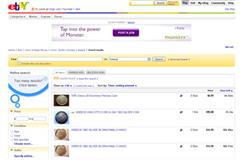Whether you're looking for a collectible or thinking about selling an antique, an Internet
auction may be just the place for you. Since they began in 1995, Internet auctions have become perhaps the hottest
phenomenon on the Web. They offer buyers a "virtual" flea market from which to choose an endless array of
merchandise from around the world, and they provide sellers a worldwide storefront from which to market their
goods. But online auctions can be risky business, according to the Federal Trade Commission (FTC), a federal
agency that works to prevent fraud, deception and unfair practices in the marketplace. Among the thousands of
consumer fraud complaints the FTC receives yearly, those dealing with online auction fraud consistently rank at or
near the top of the list.

The complaints generally deal with late shipments, no shipments, or shipments of products that
aren't the same quality as advertised; bogus online payment or escrow services; and fraudulent dealers who lure
bidders from legitimate auction sites with seemingly better deals. Most complaints involve sellers, but in some
cases, the buyers are the focus. Whether you're a buyer or a seller, understanding how Internet auctions work can
help you avoid these problems.
Auction Rules
Internet auctions are online bazaars. Some are the scenes of business-to-person activity, where a
Web site operator physically controls the merchandise for sale and accepts payment for the goods. But most
specialize in person-to-person activity where individual sellers or small businesses auction their items directly
to consumers. In these auctions, the seller - not the site - has the merchandise. The person-to-person sites
require sellers to register and obtain a "user account name" (or "screen name") before they can place items for
bid. Sellers also must agree to pay a fee every time they conduct an auction. Many sellers set a time limit on
bidding and, in some cases, a "reserve price" - the lowest price they will accept for an item. When the bidding
closes at the scheduled time, the highest bidder "wins." If no one bids at or above the reserve price, the auction
closes without a "winner." At the end of a successful person-to-person auction, the buyer and seller communicate -
usually by email - to arrange for payment and delivery.
On-line coin auctions offer convenience and excitement but to date have been subject to far less
regulation than more traditional auctions, and that has created a climate where abuses can - and do - occur. Part of
the problem is that on-line auction companies (such as eBay)
serve merely as conduits between the buyer and the seller. Unfortunately, many bidders gain a false sense of
confidence, reasoning that the large on-line auction firms will safeguard their interests and protect them from
fraud and misrepresentation. This is not the case, however, as most on-line auction firms have disallowed responsibility
rather than cracking down fraudsters. This leaves victimized bidders to fend for themselves, so arm yourself with
the knowledge you need to deal with the real dangers involved.